

It’s All Your Fault: High Conflict People
TruStory FM
Hosted by Bill Eddy, LCSW, Esq. and Megan Hunter, MBA, It’s All Your Fault! High Conflict People explores the five types of people who can ruin your life—people with high conflict personalities and how they weave themselves into our lives in romance, at work, next door, at school, places of worship, and just about everywhere, causing chaos, exhaustion, and dread for everyone else.
They are the most difficult of difficult people — some would say they’re toxic. Without them, tv shows, movies, and the news would be boring, but who wants to live that way in your own life!
Have you ever wanted to know what drives them to act this way?
In the It’s All Your Fault podcast, we’ll take you behind the scenes to understand what’s happening in the brain and illuminates why we pick HCPs as life partners, why we hire them, and how we can handle interactions and relationships with them. We break down everything you ever wanted to know about people with the 5 high conflict personality types: narcissistic, borderline, histrionic, antisocial/sociopath, and paranoid.
And we’ll give you tips on how to spot them and how to deal with them.
They are the most difficult of difficult people — some would say they’re toxic. Without them, tv shows, movies, and the news would be boring, but who wants to live that way in your own life!
Have you ever wanted to know what drives them to act this way?
In the It’s All Your Fault podcast, we’ll take you behind the scenes to understand what’s happening in the brain and illuminates why we pick HCPs as life partners, why we hire them, and how we can handle interactions and relationships with them. We break down everything you ever wanted to know about people with the 5 high conflict personality types: narcissistic, borderline, histrionic, antisocial/sociopath, and paranoid.
And we’ll give you tips on how to spot them and how to deal with them.
Episodes
Mentioned books
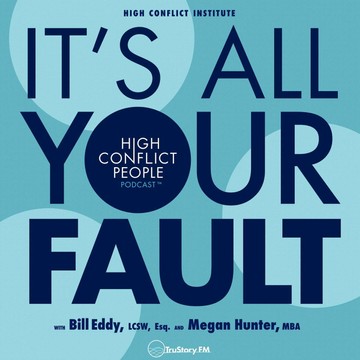
Mar 16, 2023 • 41min
Alex Murdaugh’s Personality: Is He a Sociopath, Psychopath, Antisocial?
Alex Murdaugh, central figure in a high-profile murder case, is discussed in relation to high conflict and mental health disorders. Topics include remorse, empathy, trust, aggression, personality clues, opioid addiction, and patterns of lying and gaining sympathy.
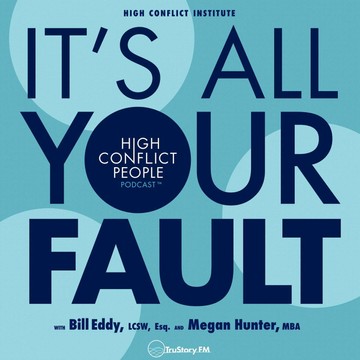
11 snips
Mar 9, 2023 • 32min
Why Connection Is So Important in High Conflict Interactions
Learn why connection is key in managing high conflict personalities, the impact of brain functions on interactions, the importance of cultural differences in relationships, and strategies for effective communication in intense situations.
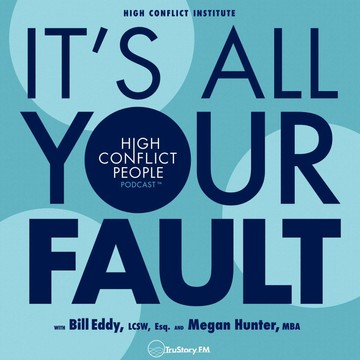
Mar 2, 2023 • 44min
High Conflict Workplace Investigations with Guest Host Cherolyn Knapp and Guest Bob Stenhouse
Guest co-host Cherolyn Knapp and guest Bob Stenhouse, founder of Verita, discuss high conflict workplace investigations, challenges posed by people with high conflict personalities, building rapport with interviewees, use of BIFF in investigations, DARVO concept, and recommendations for employers to address bullying and harassment.
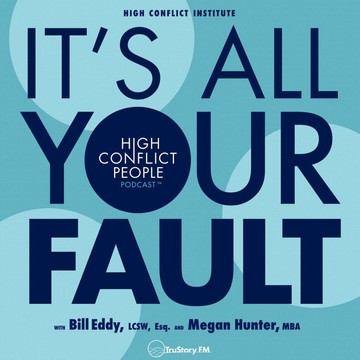
Feb 23, 2023 • 41min
Divorce Radio and Celebrity Divorce with Guest Ilyssa Panitz
Journalist and radio host Ilyssa Panitz, THE Divorce Journalist, discusses her divorce radio show, high conflict divorce during the pandemic, similarities between celebrity and regular divorces, listener feedback, and lessons learned. The podcast explores navigating challenges in divorce, the impact on celebrities, and turning hardships into positive messages.
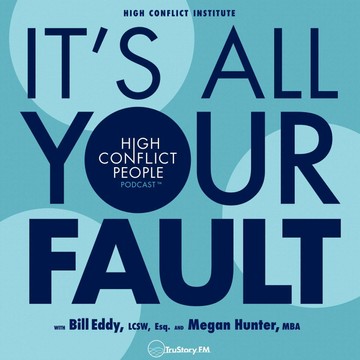
Feb 16, 2023 • 49min
10 Paradigm Shifts of High Conflict Mediation with Guest Michael Lomax
Guest Michael Lomax, an expert in high conflict mediation, discusses 10 paradigm shifts essential for mediating high conflict disputes, focusing on problem-solving and client participation. They highlight the importance of avoiding apologies, guiding parties towards future-oriented solutions, and patience in reaching agreements.
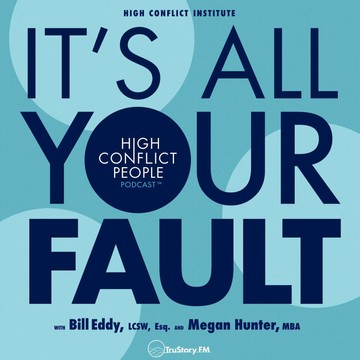
Feb 9, 2023 • 44min
Family Law in Israel with Guest Michal Fein
Is it possible to change family law in an entire country? Change that results in improvements for families, and especially for children?In today’s episode, Bill and Megan talk with family law attorney, Michal Fein, of Tel Aviv, Israel, about a law she wrote to address some problematic issues in Israel’s family law system—the Family Disputes Settlement Law. They will discuss:what prompted the change and why it was neededwhat the Family Disputes Settlement Law was intended to dowhether it was met with resistance and were there implementation challengesdata at the two-year and six-year marks—did court applications (filings) increase, decrease or stay the samedid the new law impact domestic violence, alienation, mediation and other divorce-related challengeswhether the pandemic impacted divorce rates in IsraelMichal’s hope for the future of family law in IsraelLinks & Other NotesWEBSITE for MICHAL FEINNews and BlogsARTICLE: How Israel Substantially Reduced Litigation In Family CourtOur website: https://www.highconflictinstitute.com/Submit a Question for Bill and MeganAll of our books can be found in our online store or anywhere books are sold, including as e-books.You can also find these show notes at our site as well.Note: We are not diagnosing anyone in our discussions, merely discussing patterns of behavior.
(00:00) - Welcome to It's All Your Fault
(01:25) - Meet Michal Fein
(04:19) - Question Round
(08:37) - Background of Her Law
(22:24) - Resistance
(24:57) - Implementation
(27:04) - Changing Over Time
(30:24) - Changes They've Seen
(33:25) - Domestic Violence
(36:11) - Mediation
(37:19) - Affects of Pandemic
(39:50) - Hope for Family Law's Future in Israel
(42:10) - Wrap Up
(43:12) - Reminders & Coming Next Week: Connection in High Conflict Interactions
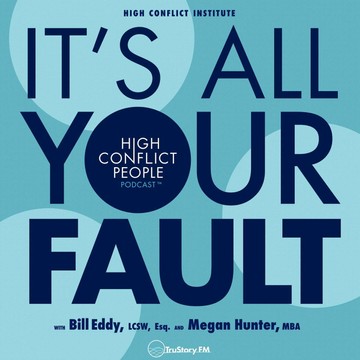
10 snips
Feb 2, 2023 • 30min
Telling a High Conflict Spouse That You Want a Divorce
Divorcing a high-conflict spouse? The hosts tackle the daunting task of breaking the news, emphasizing careful preparation and clear communication. They discuss the emotional turmoil involved, potential safety risks, and the importance of choosing the right moment and environment. With insights on how to inform children and maintain support systems, they provide crucial advice on navigating this tricky terrain. Plus, look forward to innovative family law discussions aimed at fostering cooperation between parents.
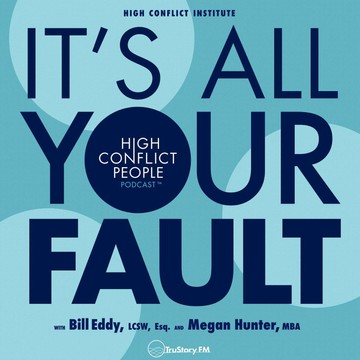
9 snips
Jan 26, 2023 • 27min
Getting it Backwards in Family Court—Winners & Losers
Navigating family court can be a daunting task, especially with high conflict personalities involved. The discussion dives into how emotional manipulation can skew perceptions, leaving the wrong parent painted as the villain. Misjudgments in cases of domestic violence and parental alienation are examined, illustrating the potential for tragic outcomes. The importance of open-mindedness and careful evidence gathering is emphasized to ensure fair resolutions, ultimately prioritizing the well-being of children.
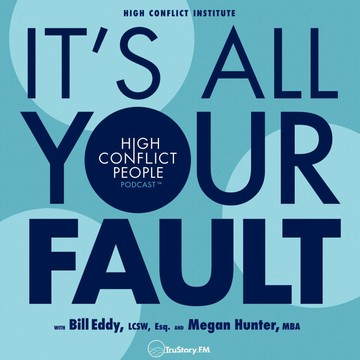
8 snips
Jan 12, 2023 • 31min
The New Elephant in the Room: Personality Disorders
Explore the enigmatic world of personality disorders, where Bill and Megan dissect what makes them unique and their prevalence in society. They shed light on how these disorders manifest in everyday relationships and caution against labeling individuals too hastily. The discussion dives into the intersection of personality disorders and criminal behavior, referencing a notable case. Listeners learn to recognize key traits and understand the importance of compassion in managing relationships with those exhibiting such patterns.
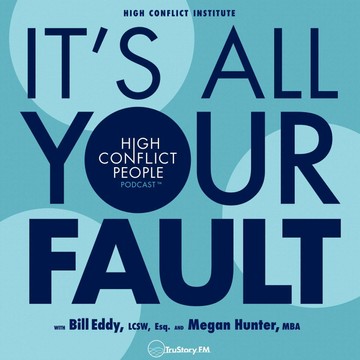
8 snips
Jan 5, 2023 • 33min
Confirmation Bias in High Conflict Situations: How to Avoid Being Fooled by High Conflict People
Discover the pitfalls of confirmation bias and how it influences our beliefs and decisions. The hosts delve into its impact on social media, politics, and high-stakes court cases. They explore the serious ramifications of biased information, such as wrongful convictions in historical abuse cases. Learn how to maintain critical thinking amidst the noise and avoid being misled by high conflict individuals. With practical tips on remaining open-minded and skeptical, this discussion offers valuable insights for navigating high conflict situations.


